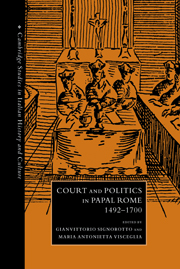Book contents
- Frontmatter
- Contents
- List of abbreviations
- Introduction
- 1 A turning-point in the history of the factional system in the Sacred College: the power of pope and cardinals in the age of Alexander VI
- 2 Court and city in the ceremony of the possesso in the sixteenth century
- 3 ‘Rome, workshop of all the practices of the world’: from the letters of Cardinal Ferdinando de' Medici to Cosimo I and Francesco I
- 4 The ‘world's theatre’: the court of Rome and politics in the first half of the seventeenth century
- 5 Factions in the Sacred College in the sixteenth and seventeenth centuries
- 6 The Secretariat of State as the pope's special ministry
- 7 The cardinal-protectors of the crowns in the Roman curia during the first half of the seventeenth century: the case of France
- 8 The squadrone volante: ‘independent’ cardinals and European politics in the second half of the seventeenth century
- 9 Roman avvisi: information and politics in the seventeenth century
- 10 Hegemony over the social scene and zealous popes (1676–1700)
- Index
- CAMBRIDGE STUDIES IN ITALIAN HISTORY AND CULTURE
3 - ‘Rome, workshop of all the practices of the world’: from the letters of Cardinal Ferdinando de' Medici to Cosimo I and Francesco I
Published online by Cambridge University Press: 09 July 2009
- Frontmatter
- Contents
- List of abbreviations
- Introduction
- 1 A turning-point in the history of the factional system in the Sacred College: the power of pope and cardinals in the age of Alexander VI
- 2 Court and city in the ceremony of the possesso in the sixteenth century
- 3 ‘Rome, workshop of all the practices of the world’: from the letters of Cardinal Ferdinando de' Medici to Cosimo I and Francesco I
- 4 The ‘world's theatre’: the court of Rome and politics in the first half of the seventeenth century
- 5 Factions in the Sacred College in the sixteenth and seventeenth centuries
- 6 The Secretariat of State as the pope's special ministry
- 7 The cardinal-protectors of the crowns in the Roman curia during the first half of the seventeenth century: the case of France
- 8 The squadrone volante: ‘independent’ cardinals and European politics in the second half of the seventeenth century
- 9 Roman avvisi: information and politics in the seventeenth century
- 10 Hegemony over the social scene and zealous popes (1676–1700)
- Index
- CAMBRIDGE STUDIES IN ITALIAN HISTORY AND CULTURE
Summary
The expression ‘Rome, workshop of all the practices of the world’ (that is to say, of political negotiations and manoeuvre as well as of recommendations, plots and intrigue) is found in a letter sent on 13 March 1579 by Cardinal Ferdinando de’ Medici to his elder brother Francesco, second Grand-Duke of Tuscany. The letter forms part of an extensive body of correspondence, still largely unexplored, which is of great interest partly on account of the vast canvas of Rome it depicts, providing valuable information on affairs in the city, but even more so by virtue of its nature as a witness to the late sixteenth-century papal court. For Ferdinando was a shrewd and acute observer of the world of Rome under the three pontificates of which he was an eye witness: those of Pius V, Gregory XIII and Sixtus V. Descriptions of this world filled the letters he wrote almost twice a week to his father Cosimo I and his brother Francesco, dwelling in particular on the aspects that concerned them most directly, such as the relationships at court and in the College of Cardinals, the political and social rules of behaviour followed in this milieu and the nature of its ‘practices’. This article seeks to shed light on Ferdinando's experience and testimony and highlight the image of Rome as the focal point of the ‘political activity’ that took shape in this setting.
- Type
- Chapter
- Information
- Court and Politics in Papal Rome, 1492–1700 , pp. 53 - 77Publisher: Cambridge University PressPrint publication year: 2002
- 2
- Cited by



